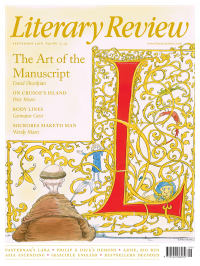Jonathan Meades
Going Underground
The Tunnel Through Time: A New Route for an Old London Journey
By Gillian Tindall
Chatto & Windus 306pp £20
Crossrail, which will eventually come to be known as the Elizabeth Line, is currently an accursed presence in central London, the most massive obstruction to traffic in an agglomeration doldrummed by such obstructions. The area around Centre Point is perpetually chaotic. Gillian Tindall’s bien-pensant contempt for that building is undermined by her getting the architect’s given name wrong: Colonel Seifert was Richard not Robert (the actual designer was George Marsh). It is hardly astonishing that she should be unsympathetic to buildings that rise high above the land, for her bias is firmly towards all that is subterranean, hidden, buried, cavernous. Priest-holes and secret passages, covert rivers, the compressed remains of forgotten houses and, fine phrase, ‘vestigial human matter’ – these whet her appetite. They fire a compulsion to explain in the most minute detail and to link the past to the present. Tindall is, of course, not the only writer to be so preoccupied. There is no burgh in Britain without its complement of burrowing ‘local’ historians, archaeologists and geologists, recounting their troves to anyone who’ll listen. What differentiates Tindall from these is the sheer scale of her enterprise and the breadth of her knowledge, which stray far beyond the ‘local’. She employs disciplines more commonly used in the study of tumuli or crypts or (increasingly) Second World War bunkers to scrutinise the route of Crossrail, the largest infrastructure project in Europe, in what was, until a few months ago, the major city in Europe. It is salutary to note that between his two stints as mayor of London in 1283 and 1298, Henry Waleys (aka le Wallais) served as mayor of Bordeaux.
The new line is here a form of armature to which can be appended multiple histories, tales of olfactory woe, folkloric gleanings, graveyard scares and a bracing dose of scepticism. Tindall is well aware of history’s dependence on extant histories and the ease with which tall stories, conspiracy yarns

Sign Up to our newsletter
Receive free articles, highlights from the archive, news, details of prizes, and much more.@Lit_Review
Follow Literary Review on Twitter
Twitter Feed
Margaret Atwood has become a cultural weathervane, blamed for predicting dystopia and celebrated for resisting it. Yet her ‘memoir of sorts’ reveals a more complicated, playful figure.
@sophieolive introduces us to a young Peggy.
Sophie Oliver - Ms Fixit’s Characteristics
Sophie Oliver: Ms Fixit’s Characteristics - Book of Lives: A Memoir of Sorts by Margaret Atwood
literaryreview.co.uk
For a writer so ubiquitous, George Orwell remains curiously elusive. His voice is lost, his image scarce; all that survives is the prose, and the interpretations built upon it.
@Dorianlynskey wonders what is to be done.
Dorian Lynskey - Doublethink & Doubt
Dorian Lynskey: Doublethink & Doubt - Orwell: 2+2=5 by Raoul Peck (dir); George Orwell: Life and Legacy by Robert Colls
literaryreview.co.uk
The court of Henry VIII is easy to envision thanks to Hans Holbein the Younger’s portraits: the bearded king, Anne of Cleves in red and gold, Thomas Cromwell demure in black.
Peter Marshall paints a picture of the artist himself.
Peter Marshall - Varnish & Virtue
Peter Marshall: Varnish & Virtue - Holbein: Renaissance Master by Elizabeth Goldring
literaryreview.co.uk